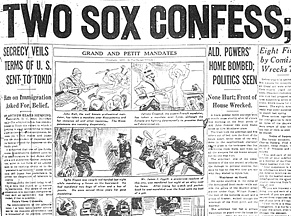





In September 1920, a Cook County, Illinois, grand jury convened to look into allegations that the Chicago Cubs had thrown games against the Philadelphia Phillies. The investigation soon extended to the 1919 World Series and baseball gambling in general. The White Sox were enjoying a good season when the grand jury began calling players, owners, managers, writers, and gamblers to testify about what had happened the previous year. At the urging of Comiskey, who was trying to cover up his own knowledge of the conspiracy, Jackson and Cicotte were the first to admit everything they knew about the fix.
When the grand jury finally concluded its investigation, indictments were handed down against the eight White Sox players, as well as Hal Chase, Abe Attell, Joe Sullivan, Bill Burns, and several of Arnold Rothstein's henchmen. Rothstein, who allegedly made $270,000 on the 1919 Series, was not indicted by the grand jury. Rothstein moved on to bootlegging, drug dealing, and labor racketeering. He was eventually murdered by a rival gambler whom he had accused of fixing a poker game. The indicted players, however, faced a trial.
The trial of the accused White Sox players, who had been suspended for the remainder of the 1920 season, began in June of 1921. The grand jury records, however, including the confessions of Jackson, Cicotte, and Williams, were reported missing (they turned up four years later in the hands of Comiskey's lawyer, George Hudnall, who never explained their reappearance). After a month of hearing testimony, it took the jury just two hours and forty-seven minutes to acquit all defendants. Lack of evidence and the missing confessions resulted in the not-guilty verdict. In the end, the trial did not answer many questions. The facts, never clear cut to begin with, continued to be manipulated, distorted, and subject to outright lies.
After the 1920 season, fearing baseball might not survive the gambling scandal, club owners decided to clean up their act. The three-man national commission, headed by Ban Johnson, was replaced by a single, independent commissioner with dictatorial power over baseball. Federal Judge Kenesaw Mountain Landis was appointed commissioner, and he acted quickly to restore the public's faith in baseball. Immediately after they were acquitted of any criminal charges, Landis banned all eight players from the game. Landis said, "regardless of the verdict of the juries, no player who throws a ball game, no player who undertakes or promises to throw a ball game, no player who sits in confidence with a bunch of crooked players and does not promptly tell his club about it, will ever play professional baseball." True to his word, Landis never allowed any of the eight White Sox to play professional ball again.
Although they were banned from baseball, several of the Black Sox were unwilling to entirely give up on the sport they loved and the only profession they had ever known. While some of the players distanced themselves from baseball, Joe Jackson, Eddie Cicotte, and Swede Risberg continued to play the game in outlaw leagues or semi-professional teams. When Jackson could no longer play ball, he owned and operated a liquor store. He died in 1951, shortly after being inducted into the Cleveland Baseball Hall of Fame. Fred McMullin died in California in 1952. Buck Weaver unsuccessfully appealed several times to Judge Landis for reinstatement in the major leagues. He ran a drugstore and died of a heart attack in 1956. Lefty Williams ran a poolroom for awhile and then moved to California and managed a landscaping business. He died in 1959. Happy Felsch ran a tavern in Milwaukee and died in 1964. Eddie Cicotte was a game warden and security guard in Detroit and died in 1970. Swede Risberg worked for many years in Minnesota on a dairy farm. He died in California in 1975.
Above text taken from here